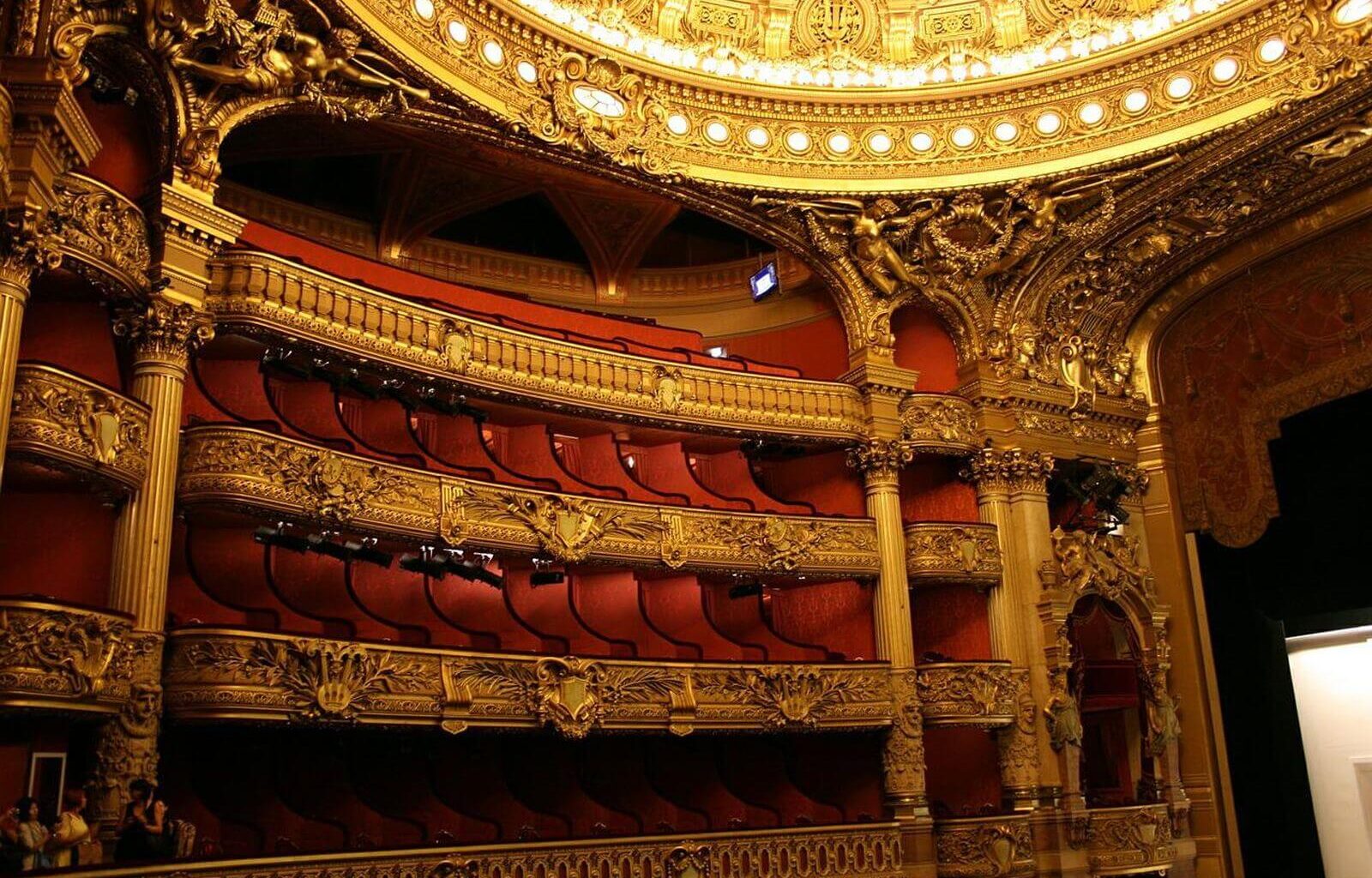History of the Paris Palais Garnier
The Palais Garnier is one of the most iconic buildings in Paris, and has been since it was first built in the 2nd half of the 19th century. It was designed by architect Charles Garnier and is an example of the Second Empire architectural style. It was the main opera house in Paris until 1989, when a new opera venue, the Place de la Bastille Opera House, was inaugurated.
The Palais Garnier is home to the Paris Opera, and is one of the most popular tourist destinations in the city. The building is also known for its many features, including its grand staircase, chandeliers, and the statues of Apollo, Lyrical Drama façade and bronze busts of Beethoven and Mozart.
The Significance of The Opera House
It is widely regarded as one of the most beautiful examples of French architecture. The Palais Garnier has been home to the Paris Opera since its opening. Today, it is used for a variety of events, including operas, ballets, and concerts. The building is also open to the public for tours. Visitors can explore the lavish auditorium, the graceful staircase, and the numerous artworks that decorate the walls and ceilings.
The opera was opened on January 5, 1875, and has been a monument historique of France since the 1920s. Along with the Louvre Museum, the Notre-Dame Cathedral and Sacre-Coeur Basilica, it is one of the most recognizable symbols of Paris.
The Palais Garnier Today
Today, the Palais Garnier continues to be an important cultural center, hosting operas, ballets, and other events. While it is best known for its grandiose design, the Palais Garnier also has a rich history. For instance, it was the setting for Gaston Leroux’s novel The Phantom of the Opera.
The Palais Garnier Exterior
When you first lay eyes on Palais Garnier, you can’t help but be impressed by its grandeur. Upon closer inspection, you’ll notice that the exterior is adorned with a wealth of decorative features, including statues, reliefs, and sculptures. Perhaps the most striking feature is the large glass dome, which is illuminated at night and offers stunning views over Paris. With its beautiful façade and spectacular interior, it’s no wonder that Palais Garnier is one of the most popular tourist attractions in Paris.
The Palais Garnier: Exterior Description
The exterior of the building is decorated with statues, friezes, and columns. There are two large sculptures of horses on the façade, “Harmony” and “Poetry”, created by a French sculptor, Charles Gumery. The theater’s front façade features gilded bronze busts of some of the finest composers, starting with Rossini and moving to the right: Auber, Beethoven, Mozart, Spontini, Meyerbeer, and Halévy.
The exterior of the building is adorned with a number of sculptures and reliefs, including a statue of Apollo which stands atop the main entrance. The façade is also decorated with a number of allegorical figures representing Music, Drama, and Dance. The Palais Garnier is truly a masterpiece of French architecture, and its exterior is well worth admiring.
The Opera House Interior
The interior is divided into corridors, stairwells, alcoves, and landings that allow for the passage of large numbers of people and socializing during intermission. The interior is characterized by opulence thanks to its rich velvet, gold leaf, and cherubim that are typical to the Baroque style. Visitors can take a guided tour of the building to learn more about its history and see some of its most famous features up close.
The Garnier Opera House: The Grand Staircase
The Grand Staircase in the Palais Garnier is one of the most iconic features of the opera house. The staircase is wide and grand, befitting of the opulent interior of the palace. It is said that the staircase was designed to allow guests to make a grand entrance into the building. The staircase is made of white marble and the balustrade is made of green and red marble. The staircase is decorated with two female torchères that were created by a French sculptor, Albert-Ernest Carrier-Belleuse.
The Grand Foyer
The Grand Foyer of the Palais Garnier is one of the most iconic spaces in Paris. Designed by Charles Garnier, the opulent foyer was intended to impress visitors with its grandeur and scale. At over 18 meters long, 54 meters long and 13 meters wide, the foyer is truly massive, and its size is accentuated by the soaring double-height ceiling.
The room is decorated with a number of ornate features, including a sweeping marble staircase, glittering chandeliers, and intricate mosaics. Despite its formality, the space is surprisingly intimate, thanks to the warmth of the materials and the clever use of light.
The Palais Garnier Auditorium
The building itself is a masterpiece of neo-Baroque architecture, and the auditorium is no less impressive. The space is decorated with lavish red and gold details, and the ceiling is painted with a stunning mural by Marc Chagall. The auditorium has a capacity of about 2,000 people, and it is mostly used for ballets. The acoustics are excellent, and the stage is large enough to accommodate complex productions. The stage can accommodate up to 450 artists and is the largest in Europe.
The Chandelier in the Palais Garnier
The Palais Garnier is home to one of the most iconic features of the Paris Opera House: the 7-ton chandelier. The chandelier is made of bronze and crystal and hangs under the ceiling painted by Marc Shagall in the auditorium.
The Location of the Palais Garnier
The Palais Garnier is located in the 9th arrondissement of Paris, on the right bank of the Seine. It sits at the corner of Rue Scribe and Rue Auber. The front of the building faces the Place de la Opera, and the back of the building extends all the way to the Rue Scribe.
Similar Posts:
- The Petit Palais: Exploring the City of Paris’ Museum of Fine Arts (Musée des Beaux-Arts de la Ville de Paris)
- Domaine National du Palais Royal: A Former Royal Residence in Paris
- The Luxembourg Palace in Paris: Exploring Palais du Luxembourg, the Home of the French Senate (Sénat)
- Paris Pantheon (Le Panthéon): The History of the Pantheon Paris
- All About Place Vendome: Exploring the History and Meaning of Place Vendôme in Paris
- Château de Versailles: What You Don’t Know About the Palace of Versailles
- Métro de Paris: Paris Metro Lines, Ticket Prices and Metro Safety
- Jardin du Luxembourg, Known as Luxembourg Gardens in Paris



